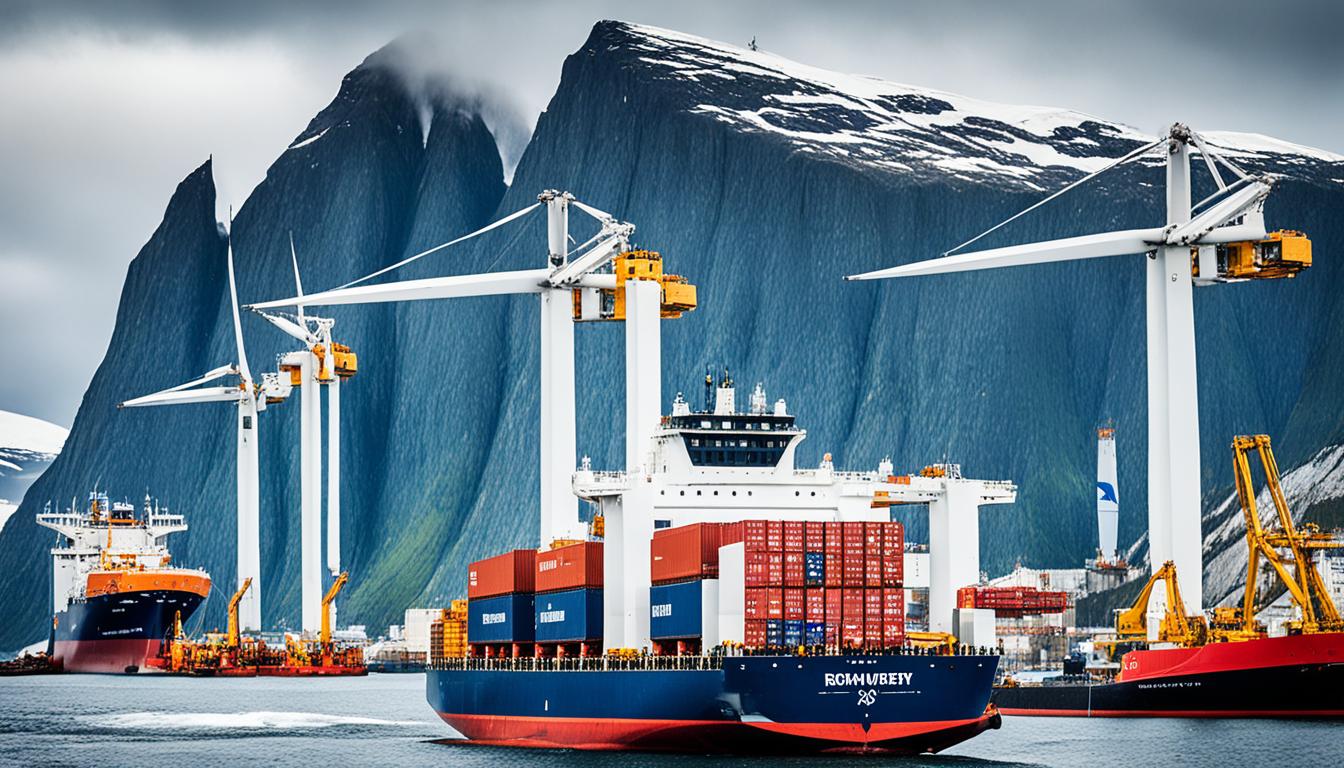
Norway is known for its beautiful fjords and strong economy. It’s also famous for its forward-thinking social policies. It might surprise you to learn about Chinese workers’ increasing role in key Norwegian industries. These include shipping, energy, and tech in cities like Oslo and Stavanger. How have these Chinese workers become an integral part of Norway’s success story?
Key Takeaways
- Chinese companies have invested $7 billion in Norway, making China one of the top 15 countries with the largest foreign direct investment (FDI) holdings in the country.
- Chinese workers are contributing their expertise to Norway’s thriving shipping, energy, and technology sectors, bridging cultural gaps and driving innovation.
- The economic impact of Chinese labor in Norway is significant, contributing to the country’s GDP, global trade, and job creation.
- Cross-cultural collaboration between Norwegian and Chinese workers presents both challenges and opportunities in terms of workplace integration and sustainable development.
- Norway’s reputation as a leader in technology, with innovations like the MP3, is further bolstered by the contributions of Chinese talent.
The Rise of Chinese Labor in Norway’s Maritime and Energy Industries
At the beginning of the 20th century, Norway was a top maritime nation. It had a strong shipping economy. However, Norway’s share of the world fleet shrank from 6% to 4-5% by 1900. This decline was caused by changes in technology and materials used in the ships.
Then, raging from sail power to steam engines and wood to steel hulls was difficult. It forced changes in how ships were managed, what skills were needed, and where shipping companies were located.
Historical Ties: Norway’s Legacy in Shipping and Offshore Oil
Norway’s affection for the sea goes way back, to its golden age of seafaring. Its North Sea access put it at the heart of ship travel and offshore energy work.
The Growing Presence of Chinese Workers in Coastal Cities
China is making big money moves in Norway today. By 2017, their investments had reached nearly USD 7 billion. These companies are pouring money into Norway’s energy, transportation, chemicals, and consumer goods sectors. As a result, China is among the 15 leading foreign investors in Norway.
| Sector | Chinese Investment (USD Billion) |
|---|---|
| Energy | 2.5 |
| Transportation | 1.8 |
| Chemicals | 1.2 |
| Consumer Goods | 1.5 |
Norwegian Fjords to Tech Hubs: How Chinese Workers Contribute to Shipping, Energy, and Technology
Norway is known for its deep connection to the sea and leading tech advancements. This has drawn Chinese workers to the country. They are key in developing Norway’s shipping, energy, and tech sectors.
Bridging Cultures: Chinese Expertise in Norway’s Shipping Sector
In the early 1900s, Norway was a big name in world shipping. It poured more money into its merchant navy than anyone. But, newer steam and steel ships lowered its share of the world’s fleet from 6% to 4-5%.
Today, Chinese experts are breathing new life into Norway’s shipping. They bring needed skills and a fresh outlook.
Fueling Norway’s Energy Ambitions with Chinese Labor
Chinese workers also power Norway’s energy dreams. Norway leads in clean energy and offshore energy production. Chinese pros play a big part in this, boosting innovation and growth. They work on projects and develop new tech, alongside Norwegian teams.
Technological Innovations: Chinese Talent in Norway’s Tech Hubs
Norway is a top player in tech, known for inventions like MP3s. Chinese workers have joined its tech centers. They help drive digital advancements. Together, they are changing how industries work.

The Economic Impact of Chinese Workers on Norway
Norway’s success is partly due to Chinese workers in important fields. The country’s wealth fund has over $400 billion. This means about $85,000 for each person there. It shows how much these workers contribute to Norway.
Contributions to Norway’s GDP and Global Trade
China has put about $7 billion into Norway. Now, it’s among the 15 countries that invest the most there. This money, along with the skills of Chinese workers, helps Norway’s economy and trade grow stronger.
Job Creation and Knowledge Transfer Opportunities
This mix has brought many jobs for Norwegians. It’s also led to sharing knowledge and working together across cultures. Chinese companies in fields like shipping, energy, and tech have brought new ideas. These help Norwegian workers learn more and improve their skills. This is good for long-term economic growth.
Challenges and Opportunities in Cross-Cultural Collaboration
Skillful Chinese workers are joining Norway’s maritime, energy, and tech industries. They bring new talents but also face cultural differences. This mix of benefits and challenges calls for improved cross-cultural teamwork.
Navigating Cultural Differences in the Workplace
Norwegians and Chinese people sometimes clash over how to communicate, behave in business, and balance work with life. It’s crucial to talk openly and train for cultural awareness. This approach builds understanding between the two groups.
Language Barriers and Integration Efforts
Helping Chinese workers join in by breaking down language barriers is important. Norway is offering language classes and translation help. Integrating Chinese workers socially also matters. It makes them feel more at home and part of the local community.
Sustainable Development and Environmental Considerations
Norway and China have much to share in green thinking. Chinese employees offer insights on clean energy, eco-friendly tech, and managing waste sustainably. Teamwork on green projects benefits both countries. It showcases successful cross-cultural collaboration for a better planet.
Conclusion
This article showed how Chinese workers helped Norway’s maritime, energy, and tech sectors grow. They linked the lush fjords with high-tech hubs like Oslo and Stavanger. Chinese labor boosted Norway’s energy projects and tech advances, helping the nation succeed.
With about $7 billion invested in Norway, China is now a key player in its economy. This teamwork added jobs, spread knowledge, but also faced challenges in cultural and language differences. Yet, their focus on sustainability makes this partnership good for both.
Norway aims to lead globally in tech, shipping, and green energy. The work of Chinese employees is vital for this success. The bond between Norway and China shows how working together can bring shared growth in our complex world.
FAQ
What are Norway’s major industries besides fishing?
Aside from fishing, Norway excels in industries like shipping and shipbuilding. It also thrives in technology and is famous for co-inventing MP3 with Bach Technology.
How has the Norwegian shipping industry evolved over time?
In the early 1900s, Norway led the way in shipping, boosting its economy. But, by 1900, its global fleet share decreased due to changes in technology. The shift from sail to steam, and wood to steel altered the industry’s dynamics.
What is the extent of Chinese investment in Norway’s economy?
Chinese investments in Norway have grown significantly in recent years. This includes major contributions to various sectors such as energy, transportation, and consumer goods. By 2017, these investments totaled about USD 7 billion.
How does Norway’s national wealth fund contribute to its prosperity?
Norway’s wealth fund, made with surplus revenue from oil and gas, is worth over 0 billion. It enhances each citizen’s life with around ,000. This fund plays a crucial role in making Norway among the most affluent countries in Europe.
What are some of the cultural and environmental aspects of Norway’s society?
Norway values music greatly, seen in the Oya Festival every summer. It stands out with free education and a well-funded healthcare system. Being environmentally responsible is key too.
For instance, Oslo uses the Oya Festival’s waste to power buses. And, they use energy-efficient lighting, showing commitment to a green future.
